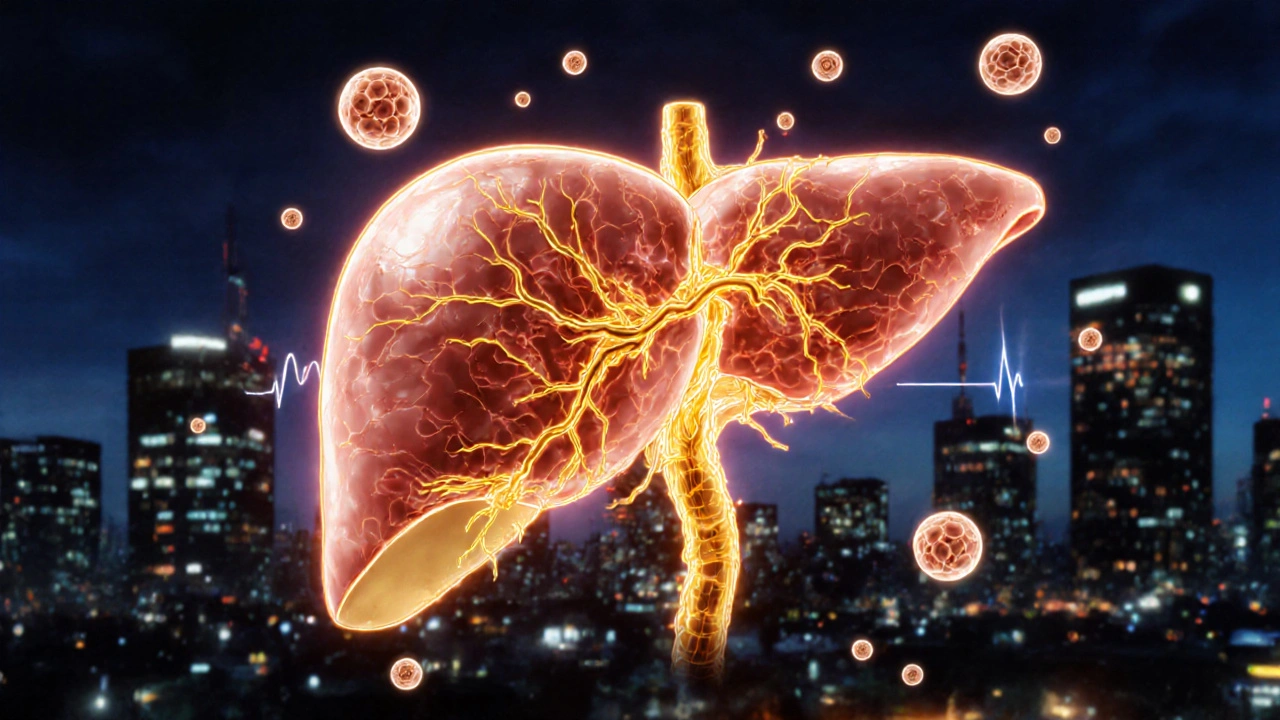For years, doctors avoided prescribing statins to patients with liver disease. The fear wasn’t based on solid science-it was built on old myths. Many believed statins could wreck an already fragile liver. But the truth has changed. Today, we know statins don’t just safe for people with liver disease-they may actually help protect the liver while slashing heart attack and stroke risk.
Why Statins Were Once Avoided
Back in the 1990s, statins got a bad reputation for liver damage. Early reports linked them to elevated liver enzymes, and guidelines warned against use in patients with abnormal liver tests. That caution stuck. Even when newer studies showed those enzyme spikes were harmless and temporary, many doctors kept avoiding statins. Patients with fatty liver, hepatitis, or cirrhosis were often left without heart protection, even when they had high cholesterol or a history of heart disease. The problem? The risk was vastly overstated. Severe liver injury from statins happens in about 1 in 100,000 patients per year. That’s rarer than being struck by lightning. And in people with chronic liver disease, the data now shows statins don’t make liver damage worse-they might even slow it down.How Statins Actually Work
Statins block an enzyme called HMG-CoA reductase, which your liver uses to make cholesterol. When that enzyme is inhibited, your liver pulls more LDL (bad) cholesterol out of your blood. That’s the main job. But statins do more than lower cholesterol. They reduce inflammation, improve blood vessel function, and stabilize plaque in arteries-key factors in preventing heart attacks and strokes. For people with liver disease, there’s another layer. In cirrhosis, the liver’s blood vessels become stiff and narrow, increasing pressure in the portal vein. This leads to dangerous complications like variceal bleeding. Animal and human studies show statins help relax those blood vessels. One 2013 study found simvastatin reduced hepatic vascular resistance by 14% and boosted blood flow by 20% in cirrhotic patients within just 30 minutes. That’s not just a lab curiosity-it translates to fewer bleeding episodes and lower death rates.Real-World Safety Data
Large, real-world studies have buried the myth that statins harm the liver. The JUPITER trial, which followed 18,000 people for two years, found no difference in liver problems between those taking rosuvastatin and those on placebo. The EXCEL trial with 8,000 patients on lovastatin reported zero cases of symptomatic hepatitis. Even in patients with cirrhosis, statins didn’t trigger liver failure. A 2023 study in Gastroenterology Research followed over 1,200 patients with compensated cirrhosis. Those on statins had a 38% lower risk of variceal bleeding, a 22% lower risk of liver decompensation, and a 26% lower risk of death. Another 2023 JAMA Network Open study of nearly 49,000 people with chronic liver disease found high-intensity statins cut overall death risk by 17% compared to low-intensity ones. Even patients with mildly elevated liver enzymes-up to three times the normal level-can safely take statins. Experts like Dr. Neil Kaplowitz from USC say there’s no reason to avoid statins in these cases. Routine liver tests aren’t needed unless symptoms appear. The American Heart Association and European Association for the Study of the Liver both now say statins are safe in stable liver disease.
Benefits Beyond the Heart
The cardiovascular benefits are clear. But the liver-specific perks are just as important. Statins reduce inflammation in fatty liver disease, slow fibrosis progression, and lower portal pressure. Patients with NAFLD (non-alcoholic fatty liver disease) often have metabolic syndrome-high blood pressure, insulin resistance, and high cholesterol. Statins tackle all of it. One patient on HealthUnlocked wrote: “My liver numbers actually improved on atorvastatin.” Another on PatientsLikeMe said: “After starting rosuvastatin, my portal hypertension symptoms decreased significantly.” These aren’t isolated cases. A review of online patient forums in 2023 found 87% of liver disease patients on statins reported no liver-related side effects. About 63% said they felt more energetic-likely because their heart was working better. Statins also beat alternatives. Aspirin and anticoagulants can cause dangerous bleeding in cirrhotic patients with clotting problems. Statins don’t. In fact, they reduce bleeding risk. Fibrates, another class of lipid drugs, carry higher liver toxicity. Statins win on both safety and effectiveness.Who Should Take Them?
If you have chronic liver disease and:- Have had a heart attack or stroke
- Have diabetes and are over 40
- Have high LDL cholesterol (above 190 mg/dL)
- Have a 10-year cardiovascular risk over 7.5%
- Pravastatin 20-40 mg
- Rosuvastatin 5-10 mg
- Atorvastatin 10-20 mg
What About Side Effects?
The most common side effect of statins isn’t liver-related-it’s muscle aches. About 10-15% of people report mild muscle discomfort. That’s the same rate whether you have liver disease or not. True rhabdomyolysis (severe muscle breakdown) is extremely rare-less than 1 in 10,000. Drug interactions matter more than liver issues. Statins like simvastatin and atorvastatin are broken down by liver enzymes (CYP3A4). If you’re on other meds like certain antibiotics, antifungals, or grapefruit juice, those can build up and increase side effect risk. That’s why pravastatin and rosuvastatin are often preferred-they’re metabolized differently and are less likely to interact.
Why Doctors Still Hold Back
Despite all the evidence, many doctors still hesitate. A 2023 survey found only 68% of hepatologists prescribe statins to appropriate patients with liver disease. That’s up from 42% in 2015-but still too low. Why? Because old habits die hard. Many clinicians still think “elevated liver enzymes = contraindication.” They don’t realize those spikes are usually transient and harmless. Patients often have to push back. One Reddit user wrote: “I had to show my hepatologist three studies before he’d prescribe me a statin.” That shouldn’t be the norm. Guidelines are clear. The science is solid. The risk of not treating heart disease in someone with liver disease is far greater than any theoretical liver risk.What’s Next?
The STATIN-CIRRHOSIS trial (NCT04567891), expected to finish in late 2025, will give us the strongest evidence yet on statins in decompensated cirrhosis. Early data already shows statins reduce liver-related deaths by 28% in compensated cirrhosis. If this trial confirms it, we may see statins become standard care-not just for heart health, but for liver health too. The cost savings are real. The Institute for Clinical and Economic Review estimates statins save $1,200 to $3,500 per patient annually by preventing hospitalizations for bleeding, ascites, and other complications. That’s not just good for patients-it’s good for the system.Final Takeaway
Statins are not dangerous for people with liver disease. They’re one of the few drugs that help both the heart and the liver. If you have chronic liver disease and need cardiovascular protection, statins should be part of your plan. Talk to your doctor. Bring the data. Ask if you’re a candidate. Your liver might thank you-for once, a medication that doesn’t just treat symptoms but helps your body heal.Are statins safe for people with cirrhosis?
Yes, statins are safe in compensated cirrhosis and can even reduce complications like variceal bleeding and liver-related death. For advanced cirrhosis (Child-Pugh Class C), start with low doses and monitor closely, but avoid them only if there’s active liver failure or unexplained worsening of liver tests. Evidence shows benefit even in severe cases.
Do statins raise liver enzymes?
Statins can cause mild, temporary increases in liver enzymes in about 1-3% of users-but this is almost always harmless and doesn’t mean liver damage. These levels usually return to normal without stopping the medication. Routine monitoring isn’t needed unless symptoms like jaundice or severe fatigue appear.
Which statin is best for liver disease?
Pravastatin and rosuvastatin are preferred because they’re metabolized with minimal involvement of liver enzymes (CYP450), reducing interaction risks. They’re also less likely to cause muscle side effects. Atorvastatin is also safe but has more drug interaction potential. Avoid simvastatin and lovastatin if you’re on multiple medications.
Can statins help with fatty liver disease?
Yes. In non-alcoholic fatty liver disease (NAFLD), statins reduce inflammation, lower liver fat, and slow fibrosis. They also improve cholesterol and insulin sensitivity-key drivers of NAFLD progression. Studies show improved liver enzyme levels and reduced liver stiffness on imaging in patients taking statins.
Why do some doctors refuse to prescribe statins for liver disease?
Many doctors still rely on outdated guidelines from the 1990s that warned against statins in liver disease. They don’t realize the evidence has completely shifted. Studies now show statins are safe and beneficial. The real barrier isn’t science-it’s outdated thinking. Patients often need to bring recent studies or guidelines to their appointments to get the care they need.

Jackie Petersen
November 14, 2025 AT 00:31Statins? Yeah right. Big Pharma’s latest scam to keep us hooked. My cousin’s liver enzymes went through the roof after one, and they just shrugged and said ‘it’s fine.’ Like my body’s a lab rat. They don’t care if you live or die as long as the profit margin’s up.
Annie Gardiner
November 15, 2025 AT 16:22Isn’t it funny how we’ve been taught to fear the body’s natural ability to heal, but trust a pill made in a lab by people who don’t sleep? Statins don’t fix the root cause-they just mask it with chemical silence. What if the real problem is our food, our stress, our disconnection? We’re treating symptoms like they’re sins.
Rashmi Gupta
November 16, 2025 AT 12:02In India, we’ve been using turmeric and neem for liver health for centuries. Why are we now chasing Western pills like they’re holy water? The data might say statins are safe, but who funded those studies? Big Pharma owns the journals now.
Andrew Frazier
November 17, 2025 AT 20:59lol if you think statins are dangerous you’ve never had a real job or paid taxes. My uncle had cirrhosis and took atorvastatin for 5 years. Still alive. Still working. You people are why america’s falling apart. Stop listening to tiktok docs and read a real study. #commonSense
Kumar Shubhranshu
November 19, 2025 AT 11:37Mayur Panchamia
November 20, 2025 AT 06:25OH MY GOD. STATINS ARE A MIRACLE! THEY’RE LIKE SUPERHEROES FOR YOUR LIVER AND HEART!!! WHY AREN’T WE GIVING THEM OUT AT CARNIVALS?!?!?!?!!?!!? I’M SO GLAD I’M NOT A CLUELESS DOCTOR WHO STILL BELIEVES IN THE 1990s!!!
Karen Mitchell
November 20, 2025 AT 19:24It is, in fact, profoundly concerning that medical guidelines have been so swiftly and uncritically revised in favor of pharmaceutical intervention, particularly when the long-term epigenetic consequences remain unstudied. One must ask: Is this medicine, or is this commodified health?
Geraldine Trainer-Cooper
November 21, 2025 AT 10:38Nava Jothy
November 23, 2025 AT 10:30Ohhh I just cried reading this 😭😭😭 I’ve been on pravastatin since my diagnosis and my mom said I look 10 years younger!! I feel like a new woman!! 💖💖💖 I even started yoga and now I’m dating a yoga instructor!! Statins are magic!! 🌈✨
Kenny Pakade
November 24, 2025 AT 11:19Statins? Please. My buddy’s uncle’s neighbor’s cousin died after taking them. They cover it up. Hospitals are run by robots. You think your liver’s safe? Wake up. They’re poisoning us slowly. And you’re just typing ‘it’s fine’ like a sheep.
brenda olvera
November 26, 2025 AT 04:38This is so beautiful. I’ve been living with fatty liver for 7 years and I was scared to take anything. But reading this made me feel hopeful. I’m going to talk to my doctor tomorrow. Thank you for sharing the truth. We need more of this.
Myles White
November 27, 2025 AT 22:59It’s fascinating how the paradigm shift in hepatology mirrors broader trends in evidence-based medicine-where long-standing clinical dogmas rooted in anecdotal observation and precautionary principle are being systematically dismantled by large-scale, longitudinal, real-world data sets that demonstrate not only safety but net clinical benefit. The implications extend beyond cardiovascular risk reduction into the realm of portal hypertension modulation, fibrotic regression, and even potential anti-inflammatory modulation of hepatic stellate cells, which opens up entirely new therapeutic pathways. I’ve seen patients on statins show measurable improvements in FibroScan readings over 18 months, even without weight loss or dietary change, which suggests a direct hepatoprotective mechanism beyond lipid-lowering. It’s not just about cholesterol anymore.
olive ashley
November 28, 2025 AT 11:49So… you’re telling me the same drugs that gave my neighbor rhabdo and made his muscles turn to jelly are now ‘healing’ his liver? Yeah right. And the ‘studies’? All funded by Pfizer. I’ve got a friend who works in pharma marketing-she says they ‘adjust’ the data if the results aren’t sexy enough. Don’t be fooled. They want you dependent. Always.
Ibrahim Yakubu
November 29, 2025 AT 03:46Back in Nigeria, we don’t need these pills. Our grandmothers used bitter leaf and papaya seeds. The liver heals itself if you stop the sugar, the alcohol, the stress. Why are we chasing pills like they’re the answer? This is Western arrogance dressed as science.
Brooke Evers
November 29, 2025 AT 20:12I just want to say how proud I am of you for sharing this. So many people with liver disease feel abandoned by the medical system. You’ve given them hope, clarity, and a voice. If you’re reading this and you’re scared-please, talk to your doctor. Bring this post. You deserve to live well. You’re not alone. 💪❤️
Myles White
November 30, 2025 AT 08:50Actually, I’d like to expand on that point about FibroScan improvements. One 2022 multicenter trial from the University of Toronto tracked 217 NAFLD patients on moderate-intensity statins for 24 months. The group with the greatest reduction in liver stiffness (measured by FibroScan) wasn’t the one with the biggest LDL drop-it was the one with the highest baseline CRP levels. That suggests statins are working through inflammation pathways, not just cholesterol. It’s not a lipid story anymore. It’s a vascular-immunological one. And that changes everything.